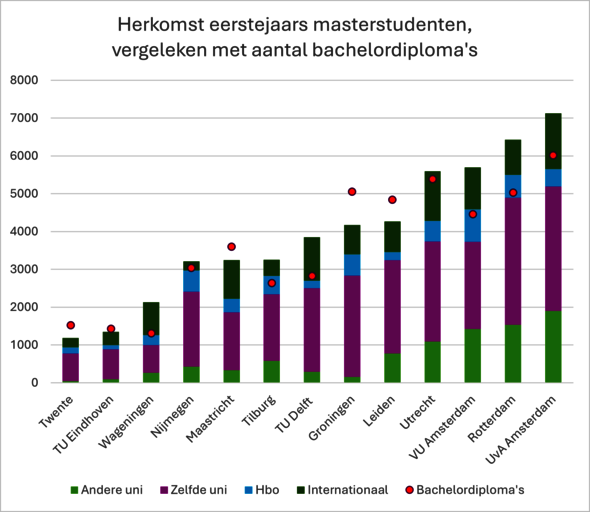Also TU/e is losing bachelor students to other universities
On obtaining their Bachelor’s degree, one in four students at Dutch universities take a Master’s degree at another university. Many of them head for Amsterdam or Rotterdam. TU/e students who get their bachelor's in Eindhoven also regularly choose another university to do a master's.
The University of Groningen awarded more than 5,000 Bachelor’s degrees last year. That’s 11 percent of all Bachelor’s degrees awarded by Dutch universities in 2023.
But by no means all these graduates continue their studies in Groningen. A significant proportion head for universities in the west of the country. Groningen, up in the north east, attracts only 8 percent of all first-year Master’s students with a Bachelor’s degree from a Dutch university.
The ‘winners’ when it comes to attracting Master’s students from elsewhere are Erasmus University Rotterdam and the two universities in the capital: VU Amsterdam and the University of Amsterdam. These three exert more pulling power than you would expect based on the number of Bachelor’s degrees they award.
The same pattern applies to Dutch universities of technology. Twente and Eindhoven lose ground, while Delft is able to welcome more Master’s students.
Eindhoven
Cursor asked a few students who were taking their break in the Auditorium if they already know where they will go for their master’s. Tycho Brouwer, bachelor’s student in Mechanical Engineering (ME), will not be leaving TU/e. “I did look into the departments at Delft, but I want to focus on Dynamics & Control and the one at TU/e is more well-known,” he says.
Another ME student, Rixt Hofman, will also be staying. “I’m a second-year but I already know I’m staying. I’m not looking for change and I certainly don’t want to leave Simon Stevin and student volleyball association Hajraa.”
Someone who does plan on leaving is Eren Okuş. The first-year student from Turkey had his plan ready even before coming to Eindhoven. “I’m getting my bachelor’s degree in Industrial Engineering here and then I’m going to the United States or the United Kingdom. I want to get into finance.”
Less certain is Fenn Zeelenberg, third-year Applied Physics student. “Maybe I’ll go to Delft for my master’s. I’m open to a new environment and Delft is ranked higher than TU/e.” And Romanian Alex Gavriliu is also still undecided. For this second-year Computer Science student, the decision of where to pursue his master’s degree very much depends on the content of the program.
Last September, Master’s programmes attracted around 35,000 new students who had obtained their Bachelor’s degree at a Dutch university. Yet over 47,000 Bachelor’s degrees were awarded in the last academic year.
So what happened to the other 12,000 students? Some apparently take a gap year or opt not to pursue their studies at Master’s level. It is likely that some international students return to their homeland for their Master’s studies. And a number of Dutch students opt for a Master’s degree abroad.
Only at the start of academic year 2020, when the Covid pandemic restricted student opportunities, did the number of new Master’s students almost equal the number of Bachelor’s degrees awarded by Dutch universities.
It’s also worth remembering that almost 11,000 students from outside the Netherlands come here especially to take a Master’s degree. Of this group, 14 percent enrol at the University of Amsterdam, while a mere 2 percent opt for Radboud University Nijmegen.





Discussion